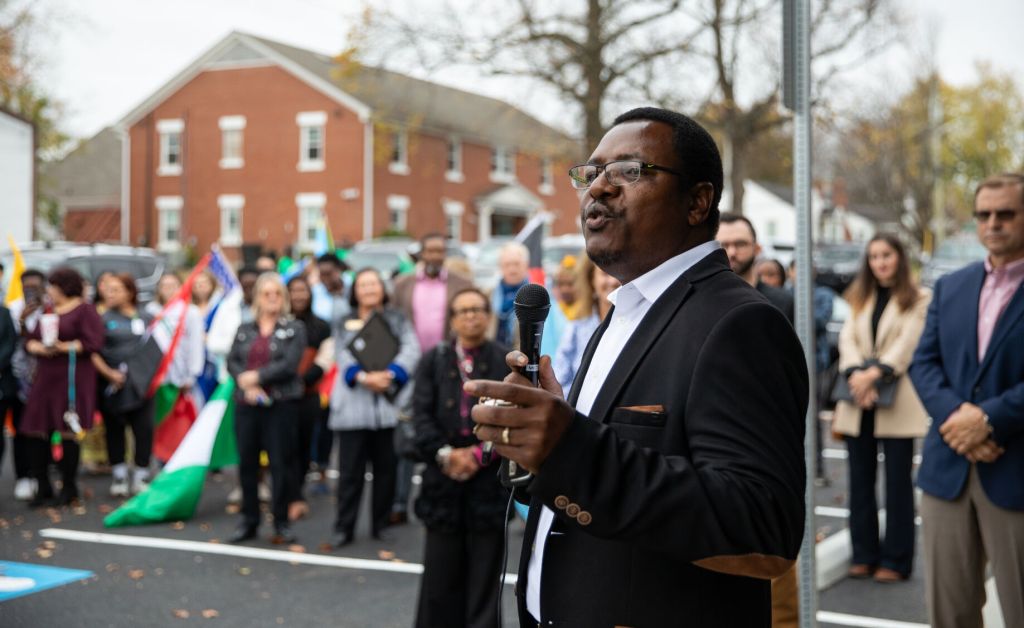Trump order halts over 50 refugees set for Bowling Green
Published 6:24 am Sunday, January 26, 2025

- International Center of Kentucky Executive Director Albert Mbanfu speaks at a ribbon-cutting ceremony in 2023.
BY DAVID MAMARIL HOROWITZ
david.horowitz@bgdailynews.com
The refugees, who were vetted, are mostly from war-torn countries
President Donald Trump’s indefinite suspension of refugee arrivals has halted flights for more than 50 vetted refugees scheduled to arrive in Bowling Green by Feb. 5, according to the local resettlement agency.
Such flight cancellations can have serious consequences, said Albert Mbanfu, executive director of the agency, the International Center of Kentucky. The indefinite suspension differs from Trump’s January 2017 executive order halting refugee arrivals, which was issued to span 120 days.
The refugees who would be arriving are considered by the United Nations High Commission for Refugees (UNHCR) as those who are the most vulnerable, Mbanfu said.
“Refugees are identified as being in need of resettlement when they are at risk in the country of asylum or have specific protection needs or vulnerabilities for which resettlement is assessed as the most appropriate durable solution,” according to the UNHCR website.
Typically, Mbanfu added, refugee arrivals are prioritized either due to cross-border rebel attacks or a particularly desperate need for stability following a “very prolonged period” in a refugee camp. In cases of the former, the suspension of travel to the U.S. exposes refugees to attacks and potentially death, Mbanfu said.
Secondly, the order comes amid a strict deadline to arrive, Mbanfu said. Refugees who arrive have undergone rigorous medical and security screenings, and those have an expiration date, Mbanfu and Kentucky State Refugee Coordinator Becky Jordan said separately.
Mbanfu estimates that those set to arrive in February, on average, will have their documents expire within 30 days. So, these refugees — mostly from the war-torn countries of Congo, Afghanistan, Burma, Somalia and Syria — will all but certainly have their screenings expire.
“By stopping these people from coming right now, it is clear that all of their documents will expire,” Mbanfu said. “When the documents expire, they have to go back to the back of the line and start all over again back when they were referred into the U.S. Refugee Admissions Program.”
Typically, these screening and referrals take at least 18 months, Mbanfu said.
Beyond the halted arrivals, the order will pause and potentially reduce per-person federal funding to resettlement agencies such as the International Center of Kentucky and affect refugees who currently live here, Jordan said.
This is because the monies that would support upcoming arrivals would additionally help fund support for current refugees supported by resettlement agencies statewide, Jordan said. Refugees who’ve arrived in the last several years are more likely to still need support such as in employment, case management and family assistance, she added.
Resettlement agencies will continue receiving at least partial funding from their respective national agencies and the Kentucky Office for Refugees, and the latter will likely be funded for the next six to nine months — but the suspension leaves 2026 fiscal year federal funding uncertain, Jordan said.
Mbanfu added that the suspension of the refugee program will “undoubtedly” limit federal funds the International Center of Kentucky receives to serve refugees.
“We as an agency will go through a very, very rough time — that’s a fact,” Mbanfu said. “Not only does it affect our work, which is humanitarian, but it morally touches us because we are an organization where the majority of the staff are refugees, and they know how beneficial the program has been to them, and that’s why they’re working here — to make sure the program is beneficial to those who come after them.”
Mbanfu issued a plea to community members.
“There are genuinely very wonderful, great people in the community who understand refugees and refugee resettlement and their contribution to the development of this city and the state, and I know that many of these people are people who support the current administration,” Mbanfu said. “My plea would be to take the knowledge they know about refugees and immigrants in this community and emphasize that to their connections with the administration to know that it is not in America’s interest to place a hold on refugee resettlement.”
The U.S. Department of Health and Human Services published a report in February 2024 finding that refugees and asylees brought a net positive fiscal impact of $123.8 billion between 2005 and 2019.
Arriving refugees previously lived in refugee camps – often, for years; these facilities are temporary and built to provide swift protection and assistance to people forced to flee home due to war, violence or persecution, according to the U.N. Refugee Agency USA for UNHCR.
Refugees are additionally the most rigorously vetted immigrant population nationwide, according to numerous experts and institutions, including the conservative nonprofit Heritage Foundation. It took, on average, 18 to 24 months between a refugee’s referral or application and their arrival in the U.S. as of 2016, according to the U.S. Department of State.






